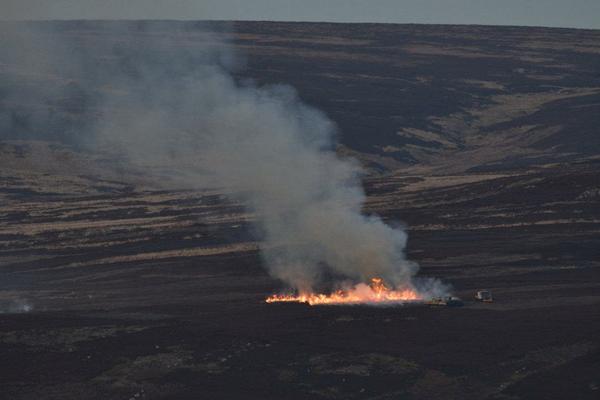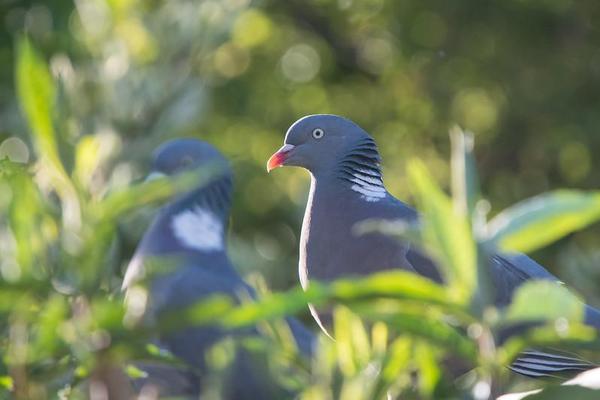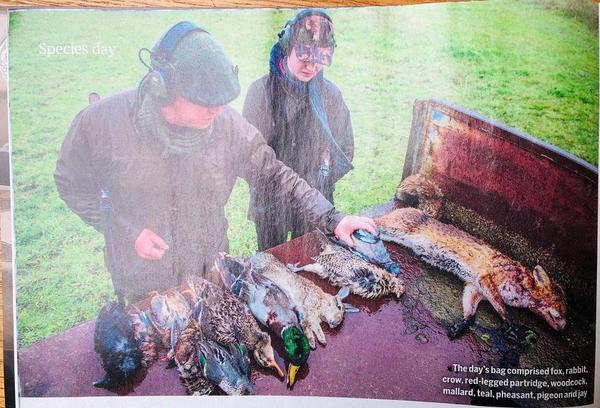Friday, 16 July 2021
Subject: Wild Justice 69 - new legal action, Shooting Times update
Thursday, 15 July 2021
The meaningless destruction of the Malay tapir
Malay tapirs need your help
No images? Click here
The meaningless destruction of the Malay tapir
Malay tapirs are glorious. These adorable animals spend their time innocently wandering around the rainforests of Southeast Asia, blissfully grazing on foliage and keeping to themselves. Often disguised in the deep undergrowth, they rarely encounter humans face to face, so we actually know surprisingly little about them.
But what we do know is shocking.
The forests they call home have become a literal death trap. The trails they use daily have been filled with tiger snares, and tapirs are being caught in the crossfire.
The effect is devastating. The poorly sighted tapirs, who try so hard to stay out of trouble, end up walking right into the traps.
It is a sickening sight. The snares cause horrific pain, tightening with each tug as the tapirs try to pull free, and the struggle can last for many hours, the cables tearing through their skin. The result is a slow and agonising death.
And the most depressing part is yet to come.
As tapir meat is considered forbidden by most locals, when these poor creatures are eventually found by poachers, they are ruthlessly and uselessly discarded.
It’s like twisting a knife in a wound - not only are these tapirs being subjected to such barbaric pain, but the whole process is totally needless and utterly devoid of sense. It is heartbreaking beyond measure.
This is why we need your help – tapirs have a relatively slow reproduction rate so their population could take many years to recover. The only way to end this tragedy is to clear the snares, and clear them fast.
Through your donations, we can get rangers patrolling the forest, detecting and safely removing snares to help protect tapirs and other wildlife. This will make a crucial difference in securing the future of the Malay tapir.
Let’s save these wonderful creatures before it is too late.
Please help save Malay tapirs - there are only 2,500 left. If everyone reading this donates just £3, you could help put rangers in the field to carry out crucial snare removal, helping to keep the forests safe for the magnificent Malay tapir. Thank you.
Brunswick the shark
Meet "Brunswick" And 8 Other Bone Chilling Great White Sharks Who Have Visited Our Jersey Shore
Big cat in Carolinas
North Carolina man reels in record-setting 127-pound blue catfish
Tuesday, 13 July 2021
BBC: Anglers on alert for invasive Pacific pink salmon
Anglers have been asked to report catches and sightings of an invasive species of salmon in Scottish rivers.
Pink salmon are native to Pacific Ocean waters but have spread to parts of northern Europe after being released into rivers in Russia in the 1960s.
"Unprecedented numbers" of the fish were found in Scottish rivers in 2017, and high numbers were again seen in 2019.
The salmon have already been caught this year in the Ness in the Highlands.
Fisheries Management Scotland (FMS) has asked anglers to report where else the fish have been found.
BBC: Giant goldfish problem in US lake prompts warning to pet owners
A city in the US state of Minnesota has urged residents not to release their unwanted pet fish into the wild after finding huge goldfish in a lake.
The common household pets can grow far bigger in the wild and cause major disruption to ecosystems.
The city of Burnsville shared images showing several monster goldfish caught during a survey of Keller Lake.
It said goldfish could contribute to poor water quality by disturbing sediment and uprooting plants.
Thursday, 8 July 2021
Saving Grauer’s gorillas
Great apes in grave danger
What’s happening is a tragedy. Nothing short of it.
Over the last few decades, Grauer’s gorillas have been practically obliterated. They’ve been under assault from all sides - hunted by humans, carved up for bushmeat, sold as pets, plagued with diseases and had their forest home decimated by illegal logging and mining.
Unsurprisingly the cost in lives has been brutal.
A staggering 77% of the population was wiped out in just 20 years - three-quarters of the population gone in less than a lifetime.
The devastating civil war in the Democratic Republic of Congo brought humans to their doorstep, and the destruction that followed was sickening. In the blink of an eye, these gentle giants found themselves thrust into the centre of the fighting - their homes demolished, entire families slaughtered.
And while the civil war is technically over, the violence has barely subsided. The gorillas are still being forced to struggle for survival, and today there are fewer than 4,000 alive.
If the loss continues at this gruesome rate, they simply won’t survive much longer.
We need to save them.
Recovery is going to be difficult - the damage is deep, and the suspension of tourism since the Covid-19 outbreak has caused a dramatic fall in the funds going towards their protection. It will take a lot of work to help bring Grauer’s gorilla back from the brink.
But we have proved it can be done – we have already aided their cousins, the mountain gorillas, helping their population rise from just a few hundred to over a thousand today. Now - with your support - we can help Grauer’s gorilla recover too.
Your donations could help fund vital forest patrols across the gorillas’ habitat, enabling rangers to monitor the wildlife, destroy illegal snares and raise awareness among local communities. This will be crucial in securing the future of this captivating great ape.
With your support, we can keep Grauer’s gorillas flourishing and free - ending the suffering they never deserved.
Please help save Grauer's gorillas. If everyone reading this donates just £3, you could fund essential patrol teams deterring illegal poaching, helping to protect this extraordinary primate. Thank you.
Wednesday, 7 July 2021
Wild Justice 68
That's it for now.
Wild Justice (Directors: Mark Avery, Chris Packham and Ruth Tingay).
Photo credit: Wood Pigeon, Tim Melling.
Sunday, 4 July 2021
New kind of carnivorous snail in India
Out of place animals in Wales
The raccoon dog, panthers, wallaby and other creatures that made a run for it in Wales
Friday, 2 July 2021
Wild Justice #67
Message Body
|
Thursday, 1 July 2021
BBC: Covid common in cats and dogs, study finds
Covid is common in pet cats and dogs whose owners have the disease, research suggests.
Swabs were taken from 310 pets in 196 households where a human infection had been detected.
Six cats and seven dogs returned a positive PCR result, while 54 animals tested positive for virus antibodies.
"If you have Covid, you should avoid contact with your cat or dog, just as you would do with other people," Dr Els Broens, from Utrecht University, said.
"The main concern is not the animals' health but the potential risk that pets could act as a reservoir of the virus and reintroduce it into the human population."
BBC: leucistic puffin
A rare white puffin has been spotted on a small island off the Sutherland coast in the Highlands.
The Scottish Wildlife Trust (SWT) said the bird was first seen on Handa Island in mid-June by seabird fieldworker Dora Hamilton.
The young puffin has only a few black feathers and its bill is largely orange.
SWT said the bird's lack of pigmentation was caused by a genetic condition called leucism.
Saving the Siamese crocodile
The timeless reptiles running out of time
They are living dinosaurs.
Siamese crocodiles are truly ancient - one of the final living connections we have to our planet’s long-lost past. For millennia, they have kept themselves to themselves and thrived in peaceful isolation.
But their time is almost up.
There are now just a few hundred left.
In an evolutionary blink of an eye these captivating creatures have been systematically slaughtered for their skin and wiped out from 99% of their former range.
They are now one of the world’s rarest reptiles, thought to be extinct until they were rediscovered in Cambodia in 2000.
And despite this terrifying decline, their struggle for survival is scarcely-known.
Siamese crocodiles are skilled natural predators, though their size means that they rarely tackle prey larger than small snakes, frogs and fish. Sadly, instead of being admired for their extraordinary agility and hunting prowess in the same way that we view species like lions and bears, crocodiles are often demonised and misunderstood.
They have faded from public view and been driven to the brink of extinction.
Unless they get help, they won't survive this crisis. Their ancient history will end now - with us - as a damning example of how humanity valued fancy leather over an entire living species.
But through your donations, we can change that. We can give them a chance.
Through your support we’re carrying out a crucial captive breeding programme in Cambodia and releasing hundreds of Siamese crocodiles into the wild - aiming to double the wild population over the next few years.
We are working closely with local communities to carry out vital research and monitoring, as well as advocating for stricter controls over crocodile farming and trade. Many local communities in Cambodia adore and admire these charismatic creatures, considering them sacred. Now we need to value them too.
That way, we can save Siamese crocodiles before it’s too late. We can stop these so-called living fossils from going the way of the dinosaurs.
Please help save Siamese crocodiles. If everyone reading this donates just £3, you could help fund our crucial captive breeding programme - helping these incredible creatures to thrive in the wild once again. Thank you.



















